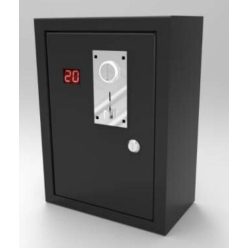Timers and time relays for scheduling kiosk, vending and machinery functions
This category offers industrial timers and time relays that help you control kiosk, self service terminal and machine functions based on time. The range includes classic DIN rail mounted delay relays, compact panel mount digital timers and programmable daily or weekly time switches, so you can manage fans, lighting, locks, buzzers or printers from the same family of devices. The focus is on robust, industrial designs with high switching endurance, wide supply voltage ranges and galvanically isolated contacts to keep your kiosk or automation system running reliably around the clock.
Timers and time relays for kiosks, self service terminals and machinery
Timers and time relays are seemingly simple but critical components in kiosks and self service systems. They make sure that functions start and stop at the right moment, supporting predictable, energy efficient operation. With time based control you can reduce unnecessary fan runtime, switch lighting on only when needed, or start printers, locks, buzzers and signal lamps with a defined delay. The category includes multi function time relays, compact panel mount digital timers, daily and weekly time switches, on delay and off delay relays, cyclic on/off timers and devices for star delta starting or pulse generation, so you can cover anything from basic delay to complex timing tasks with a consistent set of products.
Technology, functions and configuration
Modern timers are mostly electronic, using quartz or microcontroller based circuits to provide accurate timing over a wide adjustment range. Configuration can be done via front panel potentiometers, DIP switches, push button interfaces or even external communication ports. Multi function time relays typically offer several operating modes in a single device, such as on delay, off delay, pulse generation, cyclic operation, star delta timing or pre warning signals. DIN rail mounted versions integrate neatly into control cabinets, while panel mount units can be integrated into kiosk front panels and provide a clear numeric or bar graph display for status information.
Compared to consumer plug in time switches, industrial timers offer higher switching capacity, more accurate timing, wider operating temperature ranges and galvanic isolation. Many devices also support short power outages with memory functions, and provide status LEDs that make fault finding easier. At the same time it is important to choose a device that matches the application: a parking kiosk, parcel locker or production machine may require different timing logic than a simple lighting control task. Here, experienced local technical support can help you match product capabilities to real project needs.
Quality, local technical support and operation
Because timers usually work hidden inside control cabinets or kiosk housings, failures often remain unnoticed until a process does not start or stop when expected. That makes build quality, local support and planned operation especially important.
- local technical support in Hungary that helps you select timers and time relays tailored to kiosks, parcel lockers, parking systems or machine controls;
- regular preventative maintenance and inspection, including checking terminal tightness, ventilation and the condition of relay contacts and control wiring;
- respecting recommended operating conditions (ambient temperature, humidity, vibration, contamination), which is especially important in outdoor and semi outdoor kiosks;
- maintaining stock of critical timer types and organising scheduled deliveries for larger roll outs or replacement projects;
- flexible logistics options with multiple shipping methods, customs handling and freight forwarding for national and international deployments;
- commercial flexibility such as post payment terms, invoicing in foreign currencies and project based quotations that take total lifecycle cost into account.
FAQ – timers and time relays in kiosk and automation projects
- How do industrial timers differ from household time switches?
Industrial timers are designed for higher switching capacity, wider operating temperature ranges and longer service life. They usually offer multiple operating modes and are easier to integrate into control cabinets and automation systems than household plug in devices. - What should you consider when choosing a timer for your project?
Key aspects include supply voltage, switching capacity, required operating modes (delay, cyclic, pulse), timing range and mounting style (DIN rail or panel mount). It is also important to define how the device should behave after a power outage. - Why use multi function time relays instead of single function units?
Multi function devices combine several timing logics in one housing, giving you flexibility if project requirements change. You can reduce the number of different part numbers, simplify stock management and make maintenance easier across multiple kiosks or machines. - Why is local service relevant even for simple timer devices?
When troubleshooting, it helps if service staff know the detailed behaviour and settings of the selected timer and can quickly suggest replacements or compatible alternatives. This reduces downtime and ensures that kiosks and machines can be brought back into service faster.








